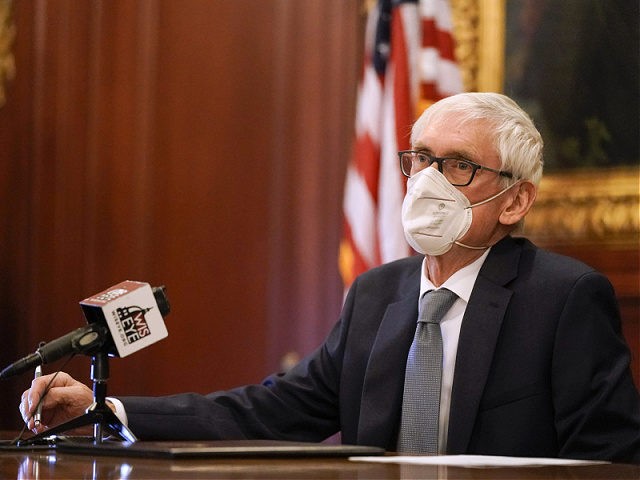Wisconsin Gov. Tony Evers (D-WI) vetoed a bill last week that partially banned the private funding of election administration.
Assembly Bill 173 passed the Republican-controlled Assembly in May by a 60 to 36 margin. The bill passed the Republican-controlled state Senate in June by an 18 to 14 margin.
The bill’s key provisions included a “ban on private resources for election administration” where funding was provided directly to local officials.
The bill also prohibited the Wisconsin Elections Commission (WEC) from accepting election administration funding from private sources and, in turn, providing those funds to local municipalities and counties “if by accepting the donation or grant the commission is required to use the private resources for specific purposes or is required to repay or return the private resources for any reason.”
Under the bill’s provisions, the WEC could accept private funding for election administration and provide those funds to municipalities and counties, provided:
- It “distribute the moneys to each municipality in this state on a per capita basis to offset the municipality’s expenses related to the administration of elections.”
- It “may expend a donation or grant of moneys accepted under this subsection only as approved by the joint committee on finance.”
“I am vetoing this bill because I object to restrictions on local governments potentially using supplemental funding for election administration,” Gov. Evers said in his veto message on Thursday:
During the coronavirus pandemic, our state and local election officials performed admirably to ensure the 2020 elections in each of our communities were conducted freely, fairly, and in accordance with our election. Counties, towns, villages, and cities across the state — both big and small — urban and rural — received non-governmental grants, which helped them conduct safe elections under extraordinary circumstances. In accordance with election laws, these resources were used to pay poll workers and purchase personal protection equipment and supplies, thereby keeping our elections safe for poll workers and voters alike.
“Regardless of the source of additional funding for election administration, election administrators must always run elections according to state and federal law,” Evers added.
Madison.com reported on Republican reaction to Evers’ veto of Assembly Bill 173:
In a statement, Assembly Majority Leader Jim Steineke, R-Kaukauna, blasted Evers for not signing what he said should be a bipartisan piece of legislation.
“Tony Evers had an opportunity to take a stand for free and fair elections in our state by signing this bill,” Steineke said. “Instead, he chose to stand with big-tech billionaires and liberal political operatives and allowed this dubious behavior to continue into the future.”
The Senate bill author, Sen. Duey Stroebel, R-Saukville, said allowing billionaires to selectively pay for election administration in certain areas has a partisan influence on Wisconsin elections, behavior that undermines public confidence in elections.
The bill vetoed by Gov. Evers last week was a much weaker prohibition of the private funding of election administration the Arizona bill signed into law in April by Gov. Doug Ducey (R-AZ), which explicitly prohibits any private funding in that state for election administration at any level of government — state, county, or municipal.
As Breitbart News reported, the private funding of election administration by nonprofit organizations funded by Facebook CEO and founder Mark Zuckerberg has been highly controversial:
Private funding of election administration was virtually unknown in the American political system until the 2020 presidential election, when Facebook CEO and founder Mark Zuckerberg and his wife Priscilla Chan donated $350 million to the Center for Technology and Civic Life (CTCL), which provided funding to county and municipal governments around the country for election administration, and $69 million to the Center for Election Innovation and Research (CEIR), which provided funding to 23 state governments, primarily through the Secretary of State’s office, also for the funding of election administration.
Empower Wisconsin reported on the controversial role CTCL played in the 2020 election in Wisconsin:
CTCL, which received $350 million in contributions from Facebook CEO Mark Zuckerberg and his wife, distributed more than $8 million in election “safety and security” grants last year to Wisconsin’s five largest cities — Milwaukee, Madison, Green Bay, Kenosha and Racine. The cities also happen to be Democratic strongholds.
The “Wisconsin 5,” as the cities were known, had to sign contracts that required them to do what CTCL wanted or they could lose the funding. Emails show Green Bay and Milwaukee worked with a CTCL partner group, the National Vote at Home Institute. Longtime Democratic operative Michael Spitzer-Rubenstein, who served as Wisconsin lead for the institute, was integrally involved in preparing for and administering November’s election in Green Bay and Milwaukee. . .
[Milwaukee Election Commissions Chief Claire] Woodall-Vogg said she doesn’t know how Wisconsin’s largest city would have gotten along without the generosity of CTCL. She also told committee members that Milwaukee received more money than previously reported — a total of $3.4 million from the Zuckerberg-funded group. The funding more than doubled Milwaukee’s election budget for 2020.
Since a two-thirds vote in both the state Senate and the state assembly is required to override Gov. Ever’s veto and Republicans do not have that margin in either the Assembly or the state Senate, Assembly Bill 173 will not become law in Wisconsin in 2021.

COMMENTS
Please let us know if you're having issues with commenting.